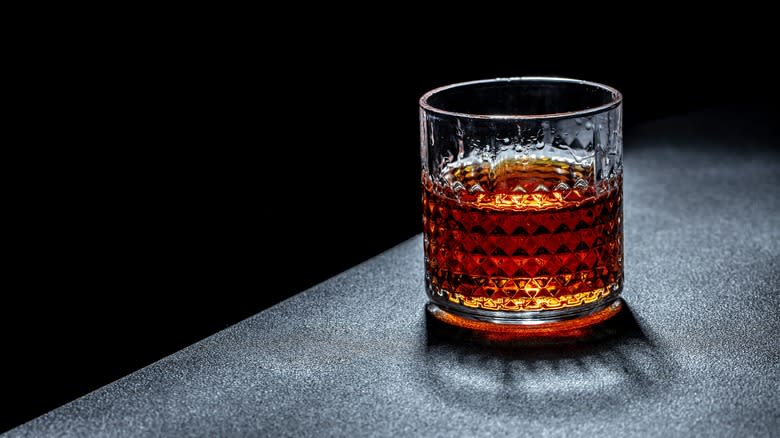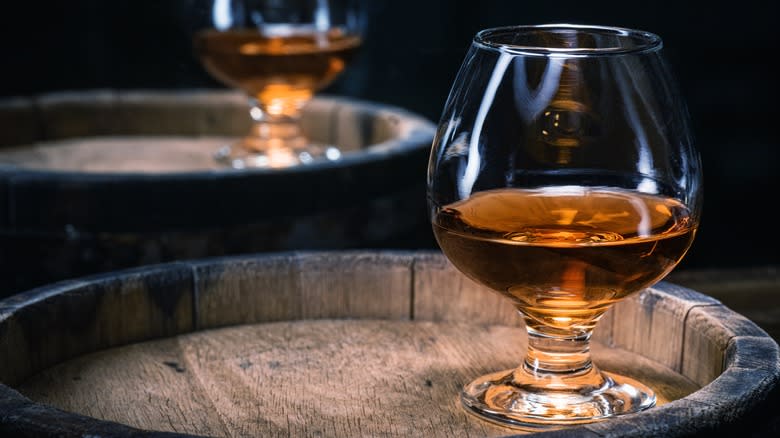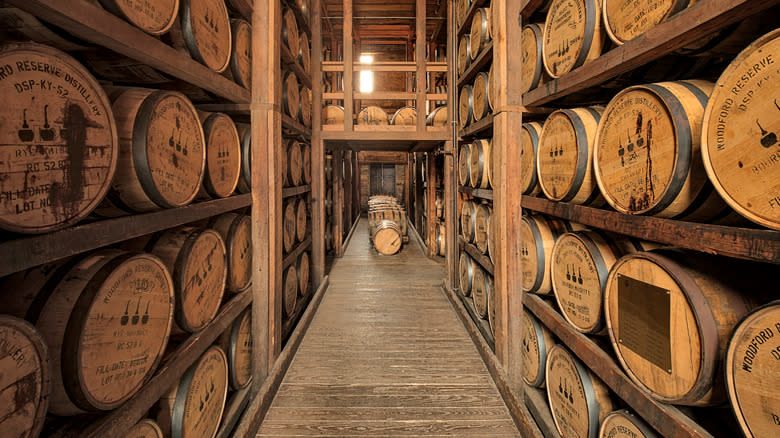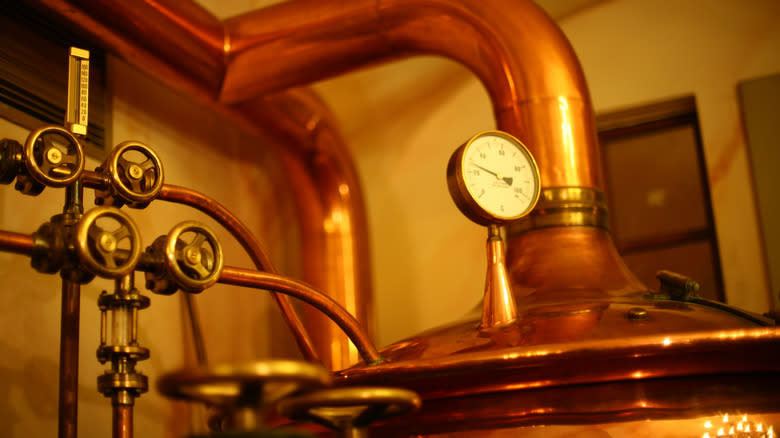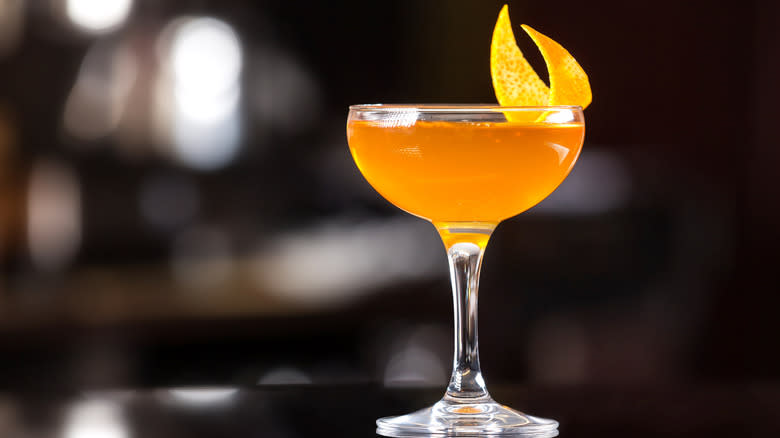Brandy and bourbon, despite sharing a warm amber hue and finding common ground in both co*cktails and culinary applications, are distinct spirits with unique characteristics that set them apart. These two beloved spirits may seem interchangeable at first glance, but a closer look reveals a tapestry of differences in their production, flavor profiles, and cultural significance.
Brandy, a broad category encompassing spirits distilled from fermented fruit juices, often brings to mind the rich, velvety notes of grapes. Whether it's the luxurious Cognac from France or the robust American brandy, these spirits deliver a nuanced sweetness and a complex bouquet of fruity aromas. Brandies thrive in the sophistication of snifters, inviting slow sips to appreciate their intricate layers.
On the other hand, bourbon emerges from the heart of American whiskey culture, crafted primarily from corn mash. The charred oak barrels used for aging impart a deep, caramelized sweetness along with hints of vanilla and a robust, smoky finish. Bourbon's versatility shines in co*cktails, from the classic Mint Julep to the tart Bourbon Sour.
While brandy whispers tales of European elegance, bourbon boasts a proud American heritage rooted in Kentucky's bourbon country. The distinction lies not only in ingredients but also in the art of aging and the cultural narratives woven into each bottle. So, whether you're savoring the velvety embrace of brandy or relishing the bold spirit of bourbon, know that these amber elixirs, though united in color, diverge on a spirited journey of taste and tradition.
Read more: The 27 Best Bourbon Brands, Ranked
What Is Bourbon?
Bourbon, an American whiskey steeped in history and tradition, stands as a testament to the country's rich distilling heritage. Originating in Kentucky in the late 18th century, bourbon has evolved into a quintessentially American spirit with distinct characteristics.
Crafted from a mash bill that must legally contain at least 51% corn, the remaining grain components are typically some combination of rye, barley, and wheat in varying amounts, and contribute to the whiskey's complex flavor profile. Further magic happens in charred new oak barrels, which are never reused for bourbon, where bourbon matures, absorbing the rich, caramelized sugars from the wood. This aging process imparts a deep amber color and infuses the spirit with layers of flavor.
Bourbon's flavor profile is a blend of sweet and savory notes. Expect a palate of caramel, vanilla, and toffee derived from the corn, balanced by a subtle pepperiness from grain, especially rye. Subtle smoky oak undertones arise from the charred barrels, creating a robust drinking experience.
Versatility is at the heart of bourbon's allure. While sipping it neat or on the rocks highlights its intricate nuances, bourbon also thrivers in co*cktails. From the timeless Whiskey Sour to the trendy Bourbon Smash, its bold character enhances the drinking experience. Bourbon's presence extends beyond the glass, finding a place in culinary delights as well. Whether used in barbecue glazes or decadent desserts, bourbon adds a distinctive American touch to gastronomy.
What Is Brandy?
Brandy, a venerable spirit with roots reaching back centuries, has woven a tapestry of sophistication and flavor through the annals of distillation history. Originating from the Dutch word "brandewijn," meaning burned wine, brandy's journey has been one of refinement and diversity. Made through the distillation of fermented fruit juices, brandy's essence lies in the luscious bounty of grapes, apples, pears, or other fruits. The process begins with the fermentation of these fruits, followed by distillation, creating a potent elixir that matures gracefully over time.
The flavor profile of brandy is a symphony of complexities. Grape brandies, like Cognac from France, boast velvety textures with hints of dried fruits, vanilla, and a subtle warmth. Apple and pear brandies offer a crisp, fruity experience, while brandies from diverse fruits add a unique touch to the palate.
Beyond its standalone sipping allure, brandy has etched its mark in mixology. Classic co*cktails like the Sidecar and theBrandy Alexander showcase its versatility, while brandy-based punches bring conviviality to gatherings. Moreover, brandy finds its way into the culinary realm, enhancing the flavors of sauces like au poivre, desserts, and even flambéed dishes.
Bourbon Requires New Barrels... Legally
Aging plays a pivotal role in shaping the character and flavor of the final product. Bourbon and brandy, both esteemed in their own right, follow distinct paths when it comes to maturation, reflecting the legal requirements that govern their production.
Bourbon adheres to stringent regulations, one of which dictates that it must be barrel-aged for a minimum of two years in new charred oak barrels. This deliberate process not only imparts a rich amber hue to the spirit but also infuses it with the complex flavors derived from the charred wood. The result is a smooth, well-rounded bourbon, aged to perfection.
In contrast, brandy embraces a spectrum of possibilities in terms of aging. Brandy can be enjoyed in its unaged and white form, showcasing the pristine essence of the distilled fruit juices. Alternatively, brandy can undergo the transformative influence of oak barrel aging. The choice between an unaged, crystal-clear brandy and one with a golden tint rests in the hands of the distiller, allowing for a versatile range of expressions.
Brandy Is Simpler To Make
Spirit production involves a meticulous dance between ingredients and processes, and when comparing brandy and bourbon, the different levels of intensity in production become evident. Brandy, crafted from fermented fruit juices, follows a relatively straightforward path to distillation. The process begins with the extraction of fruit juice, which is then subjected to fermentation. Once the sugars in the juice transform into alcohol, the liquid is distilled, capturing the essence of the fruit in a pure and unembellished form. This simplicity in production allows brandy makers to focus on the unique flavors of the fruit without the complexities of mashing and brewing.
Conversely, the journey to create bourbon is a more intricate affair. Bourbon's foundation lies in a grain mash. This grain mixture is cooked, fermented into what is known as distiller's beer, and then distilled to extract the desired spirits. The additional steps of mashing and brewing, along with the specific regulations governing bourbon production, create a more involved process. Add to that the requirement that bourbon see at least two years in new charred oak barrels as opposed to no such requirement for brandy, and the work of bringing to market bourbon becomes quite a bit more laborious in comparison.
Different Spirits For Different co*cktails
Bourbon and brandy offer distinct flavor profiles that contribute to their unique roles in the world of co*cktails. Bourbon boasts a robust and sweet character. Its flavor profile often features notes of caramel, vanilla, and oak, derived from the charred barrels in which it matures. These elements create a warm and full-bodied taste that stands out in classic co*cktails like the Old Fashioned and Manhattan.
On the other hand, brandy encompasses a wide range of styles, from the fruity and floral notes of grape brandy to the richer and spicier tones found in apple or pear brandies. This diversity allows brandy to lend itself to an array of co*cktails, including the citrusy Sidecar and the dessert-leaning Brandy Alexander.
When comparing the two, bourbon tends to offer a sweeter and more intense flavor profile, while brandy provides a broader spectrum of fruity and nuanced tastes. Bartenders often choose bourbon when crafting co*cktails that require a bold and assertive base, emphasizing its caramel and vanilla undertones. Meanwhile, brandy's versatility makes it a favorite for mixologists seeking a spirit that can adapt to sweet co*cktail creations.
Read the original article on Tasting Table.
